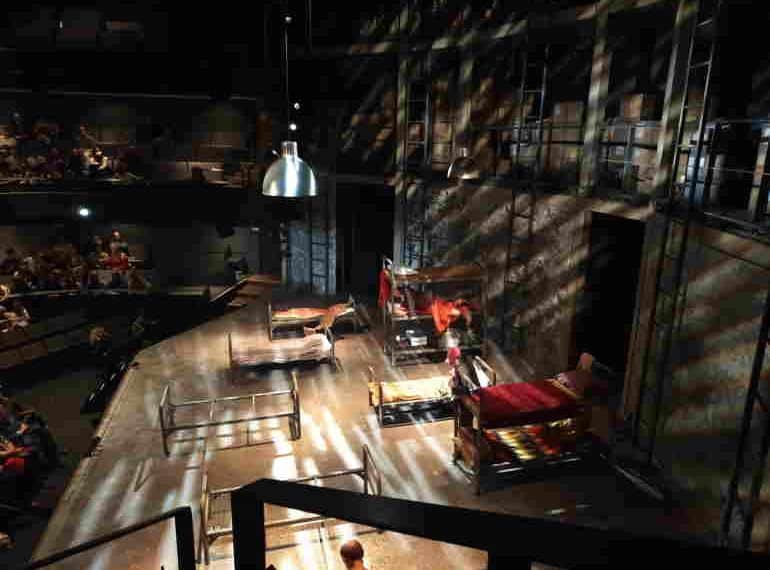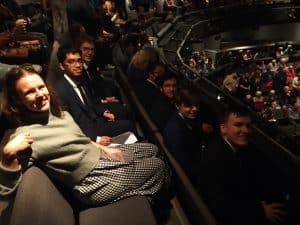
Sixth-formers made a trip to watch one of the most famous works by the influential 20th-century Marxist German playwright and poet, Bertolt Brecht.
 The group of Year 12 and Year 13 German students took the train to Kingston to watch The Caucasian Chalk Circle (Der kaukasische Kreidekreis) in the town’s Rose Theatre.
The group of Year 12 and Year 13 German students took the train to Kingston to watch The Caucasian Chalk Circle (Der kaukasische Kreidekreis) in the town’s Rose Theatre.
Languages teacher Rebecca Grundy said: “Although not an official member of the Communist party, Brecht was committed to highlighting social injustices and the imbalance of power distribution through his work.
“He was a proponent of ‘epic theatre’ (episches Theater); it was his belief that theatre is a way of showing audiences the world as it is, and of encouraging them to respond.
“Brecht made use of the ‘alienation effect’ (Verfremdungseffekt) to achieve this; theatrical devices aimed to keep the audience critically, rather than emotionally, engaged. The students enjoyed spotting these in the play.”
Set in the Soviet Union around the end of World War II, The Caucasian Chalk Circle is a re-writing of a 14th-century Chinese play, The Chalk Circle, by Li Xingdao.
It relates the story of a land dispute between two agricultural communes and of a visit by a singer and his band of musicians. The singer tells a parable as a way of settling the dispute, concluding that the land should go to those who will use it most productively – the fruit growers – and not the goat farmers who owned it previously.
It thus features a play within a play, which is itself an example of an alienation device. Other examples include the:
- Use of song to narrate the action and characters’ thoughts;
- Jarring use of props, including a teddy bear as a baby!
- Sparse set.
 The visit reinforced the boys’ Sixth Form German studies. The Sixth Form course covers Berlin and its cultural scene. Brecht lived and worked in East Berlin for a large part of his career, although The Caucasian Chalk Circle was written in the United States, where Brecht was living in exile during the war.
The visit reinforced the boys’ Sixth Form German studies. The Sixth Form course covers Berlin and its cultural scene. Brecht lived and worked in East Berlin for a large part of his career, although The Caucasian Chalk Circle was written in the United States, where Brecht was living in exile during the war.
He returned to East Berlin after the war and died there in 1956 at the age of 58. At first supportive of the government’s repressive measures following the East German uprising of 1953, Brecht eventually expressed his disillusionment over the events
The trip was organised by Ms Grundy, who accompanied the group, together with her fellow Languages teacher, Katrin Hood.
Year 12’s Hanan Moyeed said: “This trip was absolutely unforgettable. Seeing the play was a brilliant experience. It also links well to what we have been looking at in lessons.”
